Cabin fever set in? Home video can help. Here’s an alphabetical guide to get you through a few more weeks of winter.
But first: the kids. Them. My friends in Boston are practically home-schooling these days, due to weather-related disturbances. Fortunately there are some good options for the whole family as this dreaded “mid-winter break,” something that I recall was dreamed up in my childhood, and has returned to plague me as a parent, comes to its end.
Like two Oscar nominees for best animated feature–which, due to the surprise exclusion of The Lego Movie, is the most hated category of the year, taking the place of usual suspects like best original song and best foreign-language film. We love the movie, and we’re puzzled, too. Was it the switch to live action for its excellent third act? Its corporate origins?
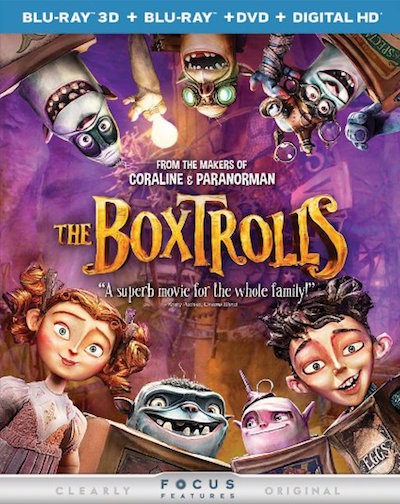 We liked, but didn’t love, one of the nominees, The Boxtrolls, just as we liked, and didn’t love, the two other movies from Laika, Coraline (2009) and ParaNorman (2012). The stop motion animation exceeds their usual high standards, and it looked entrancing in 3D, on our 110″ screen. (Santa upgraded our home theater, big time, just before Christmas.) But it has trouble sustaining its storybook-derived premise, wherein some lovably oddball monsters living below the streets of “Cheesebridge” are defended by their human ward, Eggs, from a bad guy voiced by Ben Kingsley. Love him–but there’s way too much of Sir Ben, and the other town eccentrics, when what we want is more of the disarming boxtrolls. The movie keeps its best assets under wraps, then has too much trouble wrapping up. That said the Blu-ray will be gorgeous on a screen of any size, and the commentary by co-directors Graham Annable and Anthony Stacchi, in tandem with some behind-the-scenes featurettes, adds insight into an eye-popping if somewhat unengaging production.
We liked, but didn’t love, one of the nominees, The Boxtrolls, just as we liked, and didn’t love, the two other movies from Laika, Coraline (2009) and ParaNorman (2012). The stop motion animation exceeds their usual high standards, and it looked entrancing in 3D, on our 110″ screen. (Santa upgraded our home theater, big time, just before Christmas.) But it has trouble sustaining its storybook-derived premise, wherein some lovably oddball monsters living below the streets of “Cheesebridge” are defended by their human ward, Eggs, from a bad guy voiced by Ben Kingsley. Love him–but there’s way too much of Sir Ben, and the other town eccentrics, when what we want is more of the disarming boxtrolls. The movie keeps its best assets under wraps, then has too much trouble wrapping up. That said the Blu-ray will be gorgeous on a screen of any size, and the commentary by co-directors Graham Annable and Anthony Stacchi, in tandem with some behind-the-scenes featurettes, adds insight into an eye-popping if somewhat unengaging production.
More satisfying is the other nominee, the latest from Japan’s towering Studio Ghibli, The Tale of the Princess Kaguya. Everything Ghibli does commands attention, and Kaguya, an adaptation of a folk tale, is a strong entry in a distinguished canon (and possibly one of its last, alas). “Princess” is miniature girl found inside a shoot by a bamboo cutter, voiced in the English dub by James Caan; he and his wife (Mary Steenburgen, in their second go-round as the parents of offbeat children after Elf), raise her, then her curious life takes a turn toward actual royalty, and tragedy, and a celestial reckoning. This is a lovely, melancholy-tinged story of a most unusual destiny, which unfolds at a stately pace, and the watercolor-like animation is stunning. With Chloe Grace Moritz as Kaguya and Darren Criss as her suitor, this will appeal more to a teenage demographic, though my kids enjoyed the painterly hues and the magic. A lengthy making-of focused on director Isao Takahata and legendary Ghibli composer Joe Hisaishi is a fine addendum to the feature.
Disney has released three more Ghibli titles on Blu-ray. Oscar nominee Michael Keaton voices the barnstorming lead in Porco Rosso (1992), the story of a former World War I flying ace, an Italian, tracking “air pirates” across the Adriatic Sea with the help of a devoted team of crewwomen. Trouble is, he’s a pig–literally, due to what he thinks is a divine curse. (And you thought Snoopy had problems in the Great War.) Ghibli chieftain Hayao Miyazaki would revisit the flying motifs and war-related themes in what appears to be his last feature, The Wind Rises (2014). More simply drawn than many Ghibli pictures, it looks and moves like a comic strip (mores on Blu-ray than on the drab DVD), and the disc includes the original Japanese storyboards as a full-length supplement.
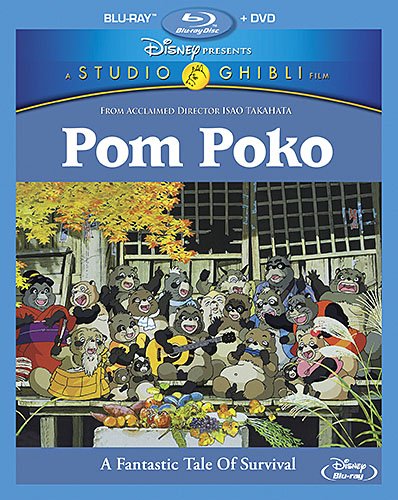 Takahata’s Pom Poko (1994) is one of the studio’s wilder flights of fancy, the story of Japanese raccoon dogs who learn to shape-shift, the better to confront their land-grabbing, polluting human neighbors. (Some of this shape-shifting involves, irreverently, their private parts, which is one instance grow to vehicle-crushing size, so consider yourselves warned and be prepared to answer a few questions.) Environmental considerations aside there’s nothing else like it from Ghibli, with its cheeky satire and earthier humor, and I got a big kick out of it (and from it, as sadness creeps into the third act). Storyboards highlight the extras; the English dub includes the voices of Jonathan Taylor Thomas, Clancy Brown, and, in keeping with my Oscar-mindedness these days, J.K. Simmons.
Takahata’s Pom Poko (1994) is one of the studio’s wilder flights of fancy, the story of Japanese raccoon dogs who learn to shape-shift, the better to confront their land-grabbing, polluting human neighbors. (Some of this shape-shifting involves, irreverently, their private parts, which is one instance grow to vehicle-crushing size, so consider yourselves warned and be prepared to answer a few questions.) Environmental considerations aside there’s nothing else like it from Ghibli, with its cheeky satire and earthier humor, and I got a big kick out of it (and from it, as sadness creeps into the third act). Storyboards highlight the extras; the English dub includes the voices of Jonathan Taylor Thomas, Clancy Brown, and, in keeping with my Oscar-mindedness these days, J.K. Simmons.
While my family awaits the Blu-ray debuts of Oscar-winning favorite Spirited Away (2001) and The Cat Returns (2002), the runt of the studio’s litter, Tales from Earthsea, has arrived. Miyazaki’s son Goro was at the helm of this costly misfire, an adaptation of an Ursula K. Le Guin fantasy that looks and sounds like a Ghibli film, yet comes across as a leaden imitation of its own works, like the breathtaking Nausicaa of the Valley of the Wind (1984). Some dragons enliven a balky, exposition-filled tale of an attempt to save a dying universe, and the 6.1 track did give my new surround audio system a nice workout. So not a total loss, just a disappointment, with one of those amusing polyglot voice casts (Timothy Dalton, Cheech Marin, Mariska Hargitay, and Willem Dafoe among them) along for the ride and an outstanding hour-long documentary about composer Tamiya Terashima and the creation of the epic’s score.
From Disney itself, there’s the Blu-ray debut of one of my favorites, 101 Dalmatians (1961), the last animated feature that Walt Disney saw completely through production. Well-chosen extras reveal that it was almost the last Disney animated feature, period–the studio was moribund after the failure of 1959’s Sleeping Beauty and it was Xerox copying techniques, reluctantly adopted, that enabled more efficient production and all those wonderful dogs that delight kids of any era. (Even ones who have seen the live-action version from 1996.) The more 101 Dalmatians goes to the dogs, the better it is; intended as a musical, it has only one song, (a good one, “Cruella De Vil”), and some dated satiric elements clash uneasily with the heartwarming misadventures of Perdita, Pongo, and their brood. It wins uglier than more pure-bred Disney fare, and I have to say that the Glenn Close version is more successful in story terms. (She’s about even with Betty Lou Gerson in her portrayal.) What fun, though, and the nicely rendered disc is loaded with extras about its difficult gestation, the cut songs, and more; plus, in HD, the episode of The Wonderful World of Disney that launched its successful premiere. RIP to Pongo, Rod Taylor, off to doggie heaven.
Finally, My Little Pony: The Movie. The one that started it all–not for my kids, who know and love the hipper, sassier ponies of today, and are climbing the stables waiting for new episodes to arrive. The one that started it all for kids circa 1986, before Hasbro and other toy companies got a handle on the whole marketing-via-movies thing, and tried to do it on the cheap. Theatrically speaking it didn’t work, and decades later we’ve got this grainy, full-frame DVD remnant, likely the best element that could be extracted from the vaults of the hapless distributor, De Laurentiis Entertainment Group. From little acorns grow big trees, however, and my smitten daughter and “brony” son were tolerably amused by this trip to the glue factory of the ponies that once were, who found their niche on TV. Me, I liked hearing from the long-departed Tony Randall and Madeline Kahn in supporting roles in an OK magic-filled adventure, and Danny DeVito and Rhea Perlman do their shtick as well.
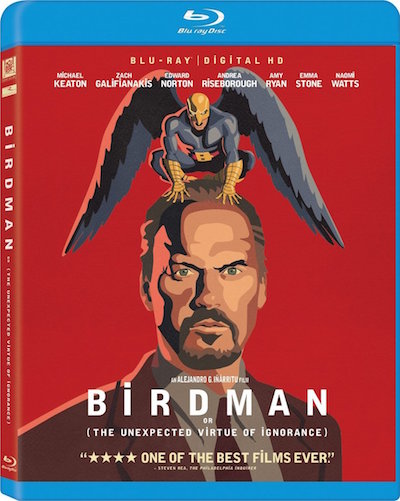 That should keep the kiddies happy. Shoo them off to bed and enjoy a few capsules. Starting with…the best picture of 2014, Birdman!
That should keep the kiddies happy. Shoo them off to bed and enjoy a few capsules. Starting with…the best picture of 2014, Birdman!
Probably. Maybe. In any case, not my favorite. (I’d rank Selma, The Grand Budapest Hotel, Whiplash, and Boyhood above it.) Why? Maybe I hate subtitles. ((or) The Unexpected Virtue of Ignorance, my ass.) I’m definitely no fan of arthouse hack director Alejandro Gonzalez Inarritu–has anyone watched 21 Grams, Babel, or Biutiful twice?–and I’m mad that he’s (probably, maybe) going to beat Richard Linklater for best director. But. It is funny, or funny-ish. I’m over the whole “single take” thing, yet probable, maybe best cinematography winner Emmanuel Lubezki has shot them with great aplomb. (Next on that front: Victoria, a heist picture shot in a single 134-minute take, beat that.) Nor am I upset with the cockeyed liberties the movie takes with Broadway, where critics lay in wait for movie actors to fail in tiny four-character plays staged in a theatre sized to fit great big musicals. Not a realist conception, the movie is taking place in the storm-tossed mind of its protagonist, played by Michael Keaton–and him I loved.
(So fucking sad that Eddie Redmayne may beat him for his limited biopic role in The Theory of Everything, a performance with none of the imagination that Keaton demonstrates. Is it time to divide the acting categories into separate categories for fictional characters and biopic parts, and maybe one more for disabled characterizations? My heart is already broken for Keaton, for 35 years a favorite of mine, and it’s only Thursday as I write this.)
I also adored nominees Edward Norton (who, regrettably, is dropped along the way, somewhere in a single take) and Emma Stone. Really, everyone gives their all, and gets behind this thing. (Theatre buffs will enjoy the inimitable Jackie Hoffman’s one-line vocal cameo.) Maybe I’m tired of movies about movies, or movie stars, like The Artist and Argo, winning best picture when there are several other options to choose from. And maybe American Sniper will win anyway.
What I can say is that I’ve now seen Birdman twice, and while I’m still not totally onboard, the Blu-ray looks and sounds biutiful. The DVD has some backstage making-ofs and candid photos taken by “Chivo” (Lubezki’s nickname); the Blu goes it one better and spotlights a talk with the star and the director. On home video, Birdman…soars.
Much, much more, folks…
App: Sometimes I don’t ask for stuff, it just shows up in the mail. So it was with this Dutch chiller, which is destined to join The Net (1995) and the Freakylinks TV show on the scrap heap of technologically obsolete movies. The story of a smartphone personal assistant program run amuck among collegians reminded me of the great Simpsons “Treehouse of Horror” episode with Pierce Brosnan, but at 79 minutes it’s paced just about right, and the disc has a clever “second screen” gimmick via app that allows enhanced viewing on your phone. William Castle lives.
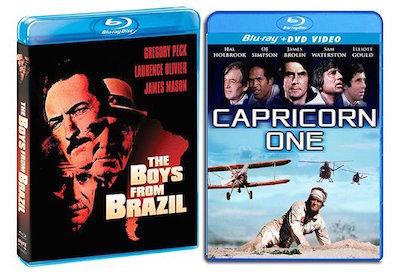 The Boys from Brazil: Grand-scale Nazi exploitation ropes in Oscar winners for the preposterous “Hitler cloning” yarn from Ira Levin (Rosemary’s Baby) that nevertheless captivated me as a teenage HBO viewer. In bizarro casting that almost works, Gregory Peck gets his swastika on as Dr. Josef Mengele, who is obliged to leave his Paraguayan hideout to carry out his dastardly scheme; his frothing-at-the-mouth performance is counterpointed by the gentle rectitude shown by elderly Nazi hunter Laurence Olivier. International jet-setting, bloody killings reminscent of Peck’s big hit from two years earlier, The Omen (1976), and small roles for distinguished stars ensue–James Mason, Rosemary Harris, Uta Hagen (terrific in one scene with Olivier), Bruno Ganz, and Anne Meara (minus Jerry Stiller) are among the notables, and, yes, that’s Steve Guttenberg at the outset. Direction by Franklin J. Schaffner (Patton) gives it a veneer of class, and Olivier, editor Robert Swink, and composer Jerry Goldsmith, contributing an excellent, waltz-inflected score, received Academy Award nominations. It’s all in highly questionable taste (with the two aged stars wrestling on a floor with a mean dog toward the end) but, what can I say, I have lingering affection for the potboilers churned out by Lord “Low” Grade’s ITC Entertainment, and I appreciate the decent if all-but-barebones Blu-ray. (Maybe Shout Factory will stream this someday on its new online channel.)
The Boys from Brazil: Grand-scale Nazi exploitation ropes in Oscar winners for the preposterous “Hitler cloning” yarn from Ira Levin (Rosemary’s Baby) that nevertheless captivated me as a teenage HBO viewer. In bizarro casting that almost works, Gregory Peck gets his swastika on as Dr. Josef Mengele, who is obliged to leave his Paraguayan hideout to carry out his dastardly scheme; his frothing-at-the-mouth performance is counterpointed by the gentle rectitude shown by elderly Nazi hunter Laurence Olivier. International jet-setting, bloody killings reminscent of Peck’s big hit from two years earlier, The Omen (1976), and small roles for distinguished stars ensue–James Mason, Rosemary Harris, Uta Hagen (terrific in one scene with Olivier), Bruno Ganz, and Anne Meara (minus Jerry Stiller) are among the notables, and, yes, that’s Steve Guttenberg at the outset. Direction by Franklin J. Schaffner (Patton) gives it a veneer of class, and Olivier, editor Robert Swink, and composer Jerry Goldsmith, contributing an excellent, waltz-inflected score, received Academy Award nominations. It’s all in highly questionable taste (with the two aged stars wrestling on a floor with a mean dog toward the end) but, what can I say, I have lingering affection for the potboilers churned out by Lord “Low” Grade’s ITC Entertainment, and I appreciate the decent if all-but-barebones Blu-ray. (Maybe Shout Factory will stream this someday on its new online channel.)
Brotherhood of Blades: China, 1627: As alliances shift, three imperial assassins are assigned to capture the head of a “eunuch clique” that had acted as a secret, and now politically inconvenient, police force. With flashbacks and multiple agendas to contend with, the storytelling gets bogged down at times–what I understand are swordplay and battles, and there’s plenty of those when the fog of plot clears. Recommended for Shaw Brothers fans who can excuse an occasional eruption of modest CGI effects.
Capricorn One: See The Boys from Brazil above. Not that I’ve ever understood why anyone would attach conspiracy theories to something as marvelous (and seemingly unrepeatable) as the moon landings, but this is a good, fast-paced thriller, with another top-notch Goldsmith score whipping reporter Elliott Gould through skullduggery involving three astronauts (James Brolin, Sam Waterston, and, in the highlight of his thespian career, O.J. Simpson) who have become a liability after a Mars launch is aborted, then faked, by NASA baddie Hal Holbrook. Pop paranoia hangs heavy over a post-Watergate scenario, and just when it’s getting clotted who turns up to save the day with exhilarating crop-dusting shenanigans than Telly Savalas? Who loves ya, baby?–We do, Telly! Triple-feature this sizable hit in its day with Boys and Coma to get a sense of the mindset back in 1978. Fans who have the DVD should hold on to it, as a commentary track from the underrated director Peter Hyams and a featurette about the politics of the time have gone missing. It’s a conspiracy...
Dark Valley: I love Westerns, and I like the German Westerns (yes, German Westerns) that were extremely popular back in the 60s, based on the wildly successful novels of Joe May and featuring Old Shatterhand and his Apache friend Winnetou. Well, this isn’t one of them, though it is an Austrian-German co-production, and has an Eastwood-ish performance by the saturnine British actor Sam Riley, from Control and Maleficent. He’s a mysterious photographer in a town in the Alps, which is controlled by a medievalist baron and his six sons. Needless to say he turns out to have more in his cases than flashbulbs, but revenge and retribution are too long to come in a slow-paced tale more impressed with scenery than gunplay. There is, however, a funny short, “The Gunfighter,” showcasing the vocal talent of Nick Offerman, to offset the listlessness of the feature and accompany a good making-of on the disc.
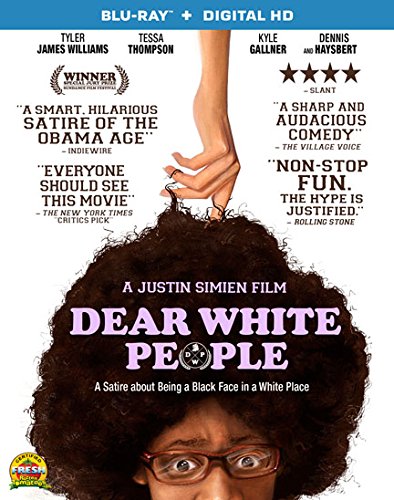 Dear White People: Writer-director Justin Simien puts himself on the map with a ramshackle comedy that’s a bunch of satirical riffs and sketches orbiting the story of college DJ Sam White (an appealing Tessa Thompson, also in Selma), whose barbed show of the title cuts some unexpected targets down to size when she nearly becomes president of the black dorm on campus. There’s a bit of Spike Lee’s School Daze (1988) in the mix as the politics of black identity take their lumps, yet the shapeless narrative takes a back seat to some hilarious sketches aimed at The Birth of a Nation, reality shows (contestants are being fielded at the school), Quentin Tarantino, and Tyler Perry. Low-hanging fruit to be sure, but few filmmakers are working in this vein, and it’ll be interesting to see where Simien next takes his comic chops and jaundiced eye. The fun spills over into the supplements, with deleted bits that the feature couldn’t contain, and a filmmaker and cast commentary track.
Dear White People: Writer-director Justin Simien puts himself on the map with a ramshackle comedy that’s a bunch of satirical riffs and sketches orbiting the story of college DJ Sam White (an appealing Tessa Thompson, also in Selma), whose barbed show of the title cuts some unexpected targets down to size when she nearly becomes president of the black dorm on campus. There’s a bit of Spike Lee’s School Daze (1988) in the mix as the politics of black identity take their lumps, yet the shapeless narrative takes a back seat to some hilarious sketches aimed at The Birth of a Nation, reality shows (contestants are being fielded at the school), Quentin Tarantino, and Tyler Perry. Low-hanging fruit to be sure, but few filmmakers are working in this vein, and it’ll be interesting to see where Simien next takes his comic chops and jaundiced eye. The fun spills over into the supplements, with deleted bits that the feature couldn’t contain, and a filmmaker and cast commentary track.
Dracula Untold: : “Untold”? Is there anything left to say about the infamous bloodsucker? Why, yes: Did you know he was basically a superhero, freeing his oppressed people, and for all the afterhours carnage maybe not so terrible after all? Me, neither–but, lacking comic book tie-ins of its own, Universal Studios is reaching back to its famous monsters of the 30s for a boxoffice boost. (Yeah, that worked out real well with Van Helsing in 2004.) Thanks to a voluptuous Blu-ray presentation, the movie, which like the Underworld flicks uses iconic creatures as action figures, is at least watchable for a spell, then the CGI begins streaming across the screen like so many clouds of bats. With Hobbit actor Luke Evans as the transforming Vlad, Sarah Gadon as his imperiled wife, and Charles Dance as the “Master Vampire” who seals his fate. It is, fortunately, brief, if overextended by all that noisy, attention-getting hubbub. Plentiful undistinguished extras include a commentary by director Gary Shore and production designer Francois Audouy (the real star of the show), deleted scenes, and a history of the actual events vaguely underpinning the silliness. I’m sticking with Penny Dreadful.
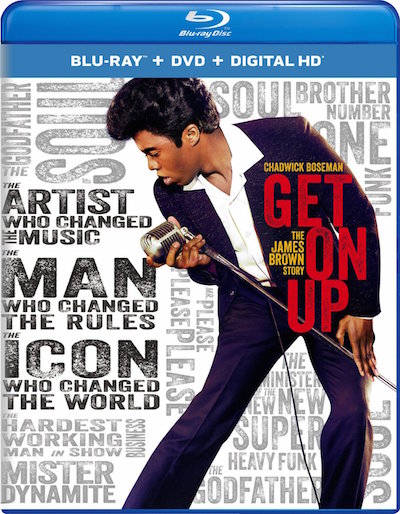 Get on Up: Jackie Robinson one year, James Brown the next? That’s range–so of course Oscar overlooked Chadwick Boseman, who jumps feet first into the part. The star of 42 and, soon, Marvel’s Black Panther is sensational in the movie, which presents Brown’s life as a collage, from his badly broken home to stardom (Dan Aykroyd is his manager, Ben Bart) to addiction issues, backstage battles, and assorted tragedies. After the stodgy The Help (with co-stars Viola Davis and Octavia Spencer retained as the key women in the singer’s tumultuous life), I didn’t think director Tate Taylor had it in him to bring out the genius and the messiness of Brown’s life, but he’s come up with the sleeper hit of the year, one that deserves to find a bigger audience on DVD and especially the stunning Blu-ray. Tons of extras, too, from Taylor’s commentary to extended song performances. It’s a good complement to HBO’s Mr. Dynamite documentary, and perhaps even richer, as it digs into his personal life and follows his story closer to its end.
Get on Up: Jackie Robinson one year, James Brown the next? That’s range–so of course Oscar overlooked Chadwick Boseman, who jumps feet first into the part. The star of 42 and, soon, Marvel’s Black Panther is sensational in the movie, which presents Brown’s life as a collage, from his badly broken home to stardom (Dan Aykroyd is his manager, Ben Bart) to addiction issues, backstage battles, and assorted tragedies. After the stodgy The Help (with co-stars Viola Davis and Octavia Spencer retained as the key women in the singer’s tumultuous life), I didn’t think director Tate Taylor had it in him to bring out the genius and the messiness of Brown’s life, but he’s come up with the sleeper hit of the year, one that deserves to find a bigger audience on DVD and especially the stunning Blu-ray. Tons of extras, too, from Taylor’s commentary to extended song performances. It’s a good complement to HBO’s Mr. Dynamite documentary, and perhaps even richer, as it digs into his personal life and follows his story closer to its end.
Henry V: Kenneth Branagh was scorned by the British press when he published an autobiography, braggingly titled Beginning, in 1990. They weren’t entirely wrong; at age 54, a sequel, Middle, would have to include a number of lousy movies behind and in front of the camera. But they weren’t right, either. In 1989, at age 29, Branagh, already an acclaimed theatre and TV performer, burst onto the screen scene with his outstanding adaptation of one of Shakespeare’s richest plays, for which he received a BAFTA award for best direction and Oscar nominations for best director and best actor. While owing something of its realist approach to Orson Welles’ Chimes at Midnight (1967), Henry V is still an accomplished and stirring debut, with an incredible band of brothers in the muck and mire, among them Derek Jacobi, Ian Holm, Paul Scofield, Branagh’s then-wife Emma Thompson, Judi Dench, and Christian Bale. Patrick Doyle’s first score rouses, too. Alas the grainy, murky Blu-ray transfer underwhelms, as does the lack of extras besides the trailer.
Jean De Florette and Manon of the Spring: On the other hand, this Blu-ray packaging of a 1986 French classic could not be more radiant, as dark deeds and the two-part unraveling of personal secrets and histories transpire under the sun-drenched skies of Provence. I knew The Simpsons was the show for me when an early episode flew Bart to France and parodied Claude Berri’s two arthouse hits, derived from Marcel Pagnol’s rustic tragedy and set post-World War I. Gerard Depardieu centers the first half as a hunchbacked landowner who disrupts the scheming of neighbors Yves Montand (in one of his last roles) and Daniel Auteuil, whose character name (“Ugolin”) was good for a laugh on the show; the ravishing Emmanuelle BÁ©art commands the second, vengeance-wracked installment. No extras besides trailers again, but the content is as compelling as a binge-watched drama of today’s vintage.
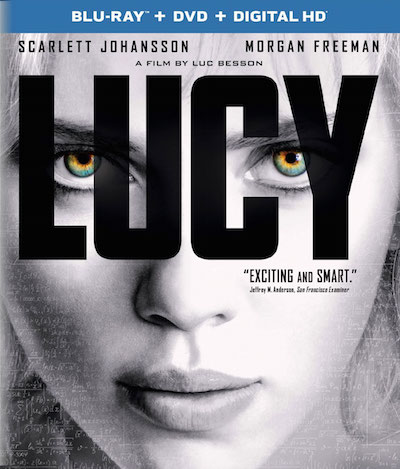 Lucy: Using 100 percent of her brain power, Scarlett Johansson–takes on the Taiwanese drug lords who got her into this fix. That’s how filmmaker Luc Besson tends to use his brain power, with a decent sci-fi premise and a game actress frittered away on daft, if pleasingly brisk, execution. As big a fan as I am of Korean actor Choi Min-sik, as the chief kingpin, he should by all rights disappear from this scenario after the first act, when Morgan Freeman (natch) pops up to aid Lucy’s dilemma. Yet back he and his tiresome gun-toting flunkies come, to reassure the punters that the movie won’t be too cerebral. And it worked–the movie was a giant hit worldwide. The Blu-ray is stupendous, too, one of those amazeballs transfers to rock your eyeballs and your subwoofer. So what do I know? Recommendation: Watch, save the minor supplementary material about the “science” of Lucy for later, and go right into Her, which unintentionally plays like a semi-sequel.
Lucy: Using 100 percent of her brain power, Scarlett Johansson–takes on the Taiwanese drug lords who got her into this fix. That’s how filmmaker Luc Besson tends to use his brain power, with a decent sci-fi premise and a game actress frittered away on daft, if pleasingly brisk, execution. As big a fan as I am of Korean actor Choi Min-sik, as the chief kingpin, he should by all rights disappear from this scenario after the first act, when Morgan Freeman (natch) pops up to aid Lucy’s dilemma. Yet back he and his tiresome gun-toting flunkies come, to reassure the punters that the movie won’t be too cerebral. And it worked–the movie was a giant hit worldwide. The Blu-ray is stupendous, too, one of those amazeballs transfers to rock your eyeballs and your subwoofer. So what do I know? Recommendation: Watch, save the minor supplementary material about the “science” of Lucy for later, and go right into Her, which unintentionally plays like a semi-sequel.
My Old Lady: Ringed with darkness though it is, this adaptation of an Israel Horowitz play (he also wrote and directed the film) is the kind of show you slip into as comfortably as a pair of old slippers. Flailing Kevin Kline learns that his father bequeathed him an apartment in Paris, a much-needed saleable asset. He also learns that the flat comes with a crusty old tenant (Maggie Smith), who claims a right to live there until she passes, and her daughter (Kristin Scott Thomas). Surprisingly, the movie doesn’t go the easy route; there’s comedy and pathos, sure, yet also a nagging desperation, particularly adhering to Kline, a faultless actor given to curious choices. Not this one, which, thanks to all three of its stars (and Delicatessen‘s Dominique Pinon, too), did brisk arthouse business and is welcome at home. Film professor Annette Insdorf interviews Kline and Horowitz for an hour in a supplementary interview segment.
No Tears for the Dead: I loves me some Korean shoot-em-ups, and his hit man is a good one if you can get past plotting so clotted a Basil Exposition type is trotted out midway to explain it all. In a nutshell, a Korean hired gun who kills a little girl on his rounds obtaining stolen data, then is obliged to off her mother. Many tables are turned (and shot, and beaten, and blowed up real good) as he objects to his assignment. Action fans not fussy about overcomplicated storylines will weep with joy at this one once it gets going. An enveloping Blu-ray presentation is topped off a detailed making of, deleted scenes, and remarks from filmmaker Lee Jeong-beom.
Once Upon a Time in Shanghai: I heart the Hong Kong-made Once Upon a Time in China movies with Jet Li, so I saw the title of this one and thought, reboot? No such luck. The drained-of-color look (it’s “once upon a time,” in 1930) is occasionally arresting; the drained-of-color storyline, involving a bright-eyed young kick boxer (Philip Ng) with gangsters, isn’t. A favorite, Sammo Hung, co-stars, as does Chen Kuan-tai, who played the lead in this one’s Shaw Brothers inspiration, 1972’s The Boxer from Shantung.
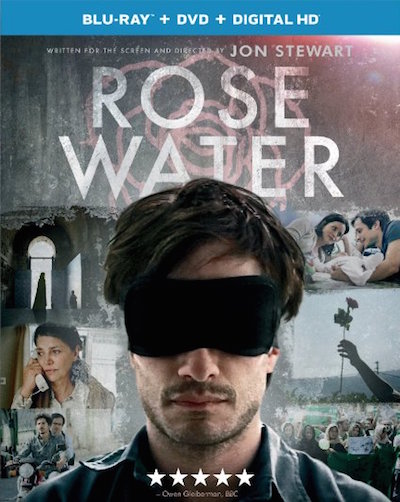 Rosewater: Is it a coincidence that Jon Stewart announced his retirement from The Daily Show the very same day his directorial debut bowed on home video, so that every account would read “Stewart, who last year directed the movie Rosewater…”? Hmm. Anyway, his well-intentioned movie torn from the files of The Daily Show could use the boost. Covering Iran’s 2009 elections for Newsweek, scribe Maziar Bahari (Gael Garcia Bernal) moonlights for Stewart’s program, is accused of aiding the nation’s “American and Zionist enemies” when president Mahmoud Ahmadinejad wins, then gets tossed into prison for several agonizing months. Most of it transpires in his cell, where Bahari is worked over by his inquisitors. The process of interrogation is harrowing; Stewart’s treatment, on the basic side, cinematically, but the movie makes its points, and I’m sure the Blu-ray makes for better viewing on the small screen than it was on the large. Five minutes of redundant supplements weren’t worth Stewart giving up his day job.
Rosewater: Is it a coincidence that Jon Stewart announced his retirement from The Daily Show the very same day his directorial debut bowed on home video, so that every account would read “Stewart, who last year directed the movie Rosewater…”? Hmm. Anyway, his well-intentioned movie torn from the files of The Daily Show could use the boost. Covering Iran’s 2009 elections for Newsweek, scribe Maziar Bahari (Gael Garcia Bernal) moonlights for Stewart’s program, is accused of aiding the nation’s “American and Zionist enemies” when president Mahmoud Ahmadinejad wins, then gets tossed into prison for several agonizing months. Most of it transpires in his cell, where Bahari is worked over by his inquisitors. The process of interrogation is harrowing; Stewart’s treatment, on the basic side, cinematically, but the movie makes its points, and I’m sure the Blu-ray makes for better viewing on the small screen than it was on the large. Five minutes of redundant supplements weren’t worth Stewart giving up his day job.
Salvo: The story of a hit man…yeah, I know, a hit man, sigh, again. This one’s a little different, however. It’s Italian and it’s pretty quiet, with a lot of heavily freighted silences and a funereal atmosphere. The hit man (Saleh Bakri, intense) knocks off a target, but decides to save his young, blind (and hot) sister, rather than kill her when she appears on the scene. Shades of The Killer (1989), they begin a relationship, minus the firepower. Not overly powered itself, Salvo gets by mostly on mood.
Supernova: Success has many fathers; this sci-fi failure from 2000, none, or, rather, one “Thomas Lee,” a pseudonym that one-time Alien scribe Walter Hill hid behind as its production went into supernova. (Francis Ford Coppola did some reshoots, no doubt pondering how his career had come full circle since he spliced penis and vagina monsters into Roger Corman’s reedit of the Soviet-produced Battle Beyond the Sun in 1962.) I don’t think it’s that terrible, just terribly confused. Co-stars Robert Forster and Lou Diamond Phillips attempt to sort it out in a candid making-of that upstages the feature, which stars James Spader, Angela Bassett, Robin Tunney, and Peter Facinelli as a trouble-making “hitchhiker” who joins their medical mission in deep space.
Traffickers: That’s organ trafficking, but this Korean thriller lacks a heart, a brain, and much of a pulse. A former trafficker is pulled in for the proverbial “one last job,” aboard a China-bound cruise ship thick with riff-raff and back stories that quickly strain credulity.
Viktor: Charles Bronson. Liam Neeson. And…Gerard Depardieu? Many years, and many pounds, after Jean De Florette, he’s a Russian art thief, incarcerated for seven years in France, who returns to Moscow to investigate the slaying of his son. Corpses pile up around his corpulence and Elizabeth Hurley, pretty much past the famous-for-being-famous point of her career, arranges herself around his bulk as his former girlfriend. John Wick it’s not, though the awkwardness of this French-Russian co-production, starring everyone’s favorite French-Russian citizen, is amusing.
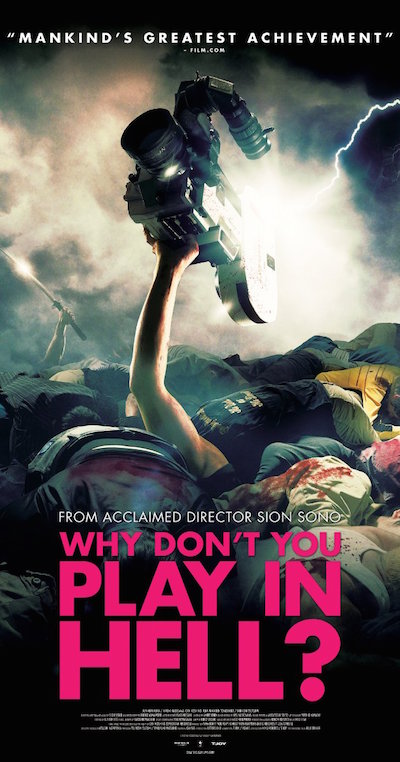 Why Don’t You Play in Hell?: A cult film in the making, about the making of cult films. “Hell” is the lawless world of low-budget exploitation movies in Japan, where director Sion Sono dwelled in the mid-90s. Here a band of outcasts, “The Fuck Bombers,” make 8mm films as kids, then after a very convoluted series of events over ten years wind up hired for an actual 35mm feature as a yakuza gang war erupts. That, however, is plot strands, which do come together to a degree–what the movie is heavy on is outlandish behavior, extreme bloody violence, and loving references to the action cinema of Japan and Hong Kong (Bruce Lee is invoked.) If this description appeals, pounce; there’s no approaching this one gingerly. Sono reminisces about the autobiographical aspects of the film with a fellow “Fuck Bomber” in a rudimentarily shot press conference that is miles below the quality of the feature.
Why Don’t You Play in Hell?: A cult film in the making, about the making of cult films. “Hell” is the lawless world of low-budget exploitation movies in Japan, where director Sion Sono dwelled in the mid-90s. Here a band of outcasts, “The Fuck Bombers,” make 8mm films as kids, then after a very convoluted series of events over ten years wind up hired for an actual 35mm feature as a yakuza gang war erupts. That, however, is plot strands, which do come together to a degree–what the movie is heavy on is outlandish behavior, extreme bloody violence, and loving references to the action cinema of Japan and Hong Kong (Bruce Lee is invoked.) If this description appeals, pounce; there’s no approaching this one gingerly. Sono reminisces about the autobiographical aspects of the film with a fellow “Fuck Bomber” in a rudimentarily shot press conference that is miles below the quality of the feature.
The Zero Theorem: You’ve got to represent for Terry Gilliam, but sometimes it’s more duty than pleasure to sit down with his scarcely distributed films. Bald and eyebrow-less, and ensconced in a desanctified church in a godless future, Christoph Waltz is cast as an oddball mathematics researcher looking into the meaning of life, an impossible task complicated by a difficult boss (David Thewlis), all-seeing management (repped by Matt Damon), a computer program (Tilda Swinton), and a comely lass (Melanie Thierry) who he sees in more in a virtual world than the actual one. Completely quirky, right down to the Kodak-like rounded image, and also completely Gilliam, untethered to a broader audience and playing to what’s left of the fan base. I’m muddling through. Supplements focused on the effects, sets, and eccentric costumes are included.
Zombie Killers: Elephant’s Graveyard: From the Department of “Sometimes I Don’t Ask for Stuff, It Just Shows Up in the Mail”: Zombies and Billy Zane, see if you can tell them apart. Not set in Africa, which would have been novel. Checklist items: Fading starlet with some semblance of a name for the box art (Mischa Barton), genre performer for a little cachet (Dee Wallace, Cujo), mild political metaphor for sociopolitical importance (fracking is blamed for the undead), and, of course, zombies, threatening a small town run by cultists who keep everyone in line, sort of. Didn’t we see this on The Walking Dead two seasons ago? Or was it three already? Yes, and that plotline had more gory action and character development. The disc (decent transfer) contains several featurettes likely to go unwatched as you reach for the “eject” button once the film is over, quickly I suspect.





Comments